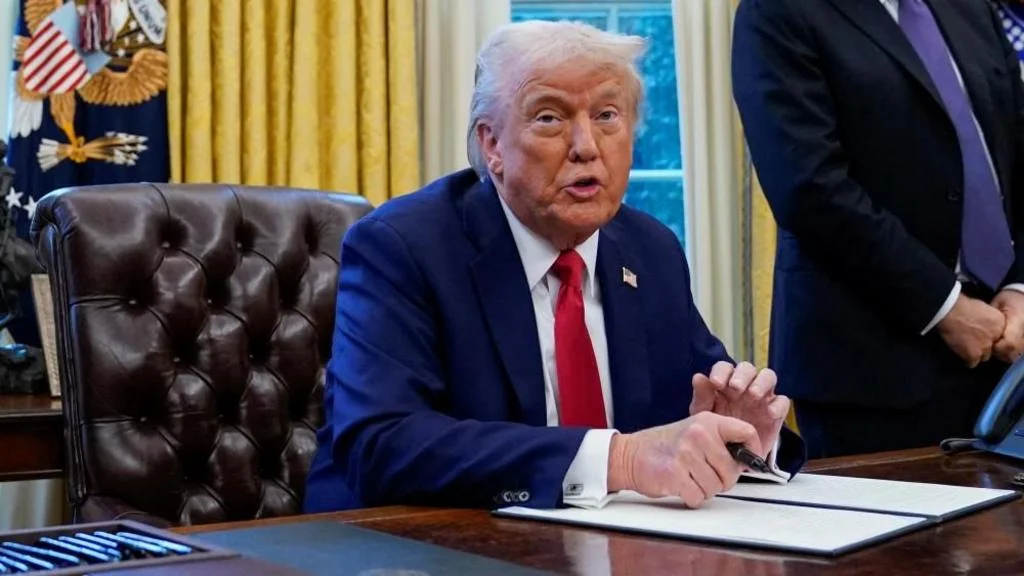- Web
- Feb 05, 2026
Trump launches trade probes for tariffs on semiconductors, pharmaceuticals
-

- Web Desk Karachi
- Apr 15, 2025

WASHINGTON: President Donald Trump’s administration pressed forward with plans to impose tariffs on semiconductors and pharmaceutical imports by initiating trade probes led by the Commerce department.
The moves, announced on Monday, in the Federal Register, are a precursor to imposing tariffs and threaten to broaden the president’s sweeping US trade war, reported Bloomberg.
The Commerce Department said it had begun investigating the impact on US national security of ‘imports of semiconductors manufacturing equipment’ as well as ‘pharmaceuticals and pharmaceutical ingredients, including finished drug products’ in a pair of register notices.
The probes, which began on April 1 and were ordered Section 232 of the Trade Expansion Act, could play out for months. Under the law, the Commerce Secretary is expected to deliver the results of his investigation within 270 days, though Trump and other officials have signalled these efforts could conclude more quickly.
The US President has long decried foreign production of drugs and chips as a threat to national security and threatened to slap tariffs on imports in a bid to revive American manufacturing of those products. But the duties could also wreak havoc on supply chains and drive up costs for Americans.
New levies threaten to roil a chips industry that notched more than $600 billion in global sales of semiconductors essential to products ranging from cars to airplanes and mobile phones to consumer electronics. Supply chains still feeling the effect of disruptions caused by the Covid-19 pandemic now could face new strains from the US duties.
The administration’s announcement came days after it exempted semiconductors, mobile phones, computers and other electronics imports from 145 percent duties applied to China. That announcement was seen as a boon to tech giants like Apple Inc. and Nvidia Corp. but Trump and his advisers quickly said the relief would be short lived and that separate levies would be placed on chips.
The Commerce Department investigation on semiconductors is designed to have a wide range, evaluating imports of both legacy and leading edge chips that are coveted for artificial intelligence applications. The probe will span imports of all semiconductors and the equipment used to manufacture them as well as electronic products that contain the components, according to the government notice.
Tariffs on the semiconductor sector risk affecting a wide range of companies that send billions of dollars in microprocessors and related goods to the US each year. Foreign makers of advanced chips including Taiwan semiconductor Manufacturing Co. and SK Hynix of South Korea could be forced to raise prices or accept smaller margins if Trump delivers on his threat of import levies.
EU pharma industry warns of ‘exodus’ to US amid Trump’s tariff threats
The measures also threaten to impose higher costs on Trump’s vision for expanding domestic semiconductor production, especially if imported chip-manufacturing equipment from companies like ASML Holding NV get hit with tariffs. Netherland based ASML is a leading provider of advanced lithography machines used to produce the smallest computer chips used in AI and other sensitive applications.
The separate drug probe will examine imports of all pharmaceuticals – both finished generic and non-generic medicines – as well as the ingredients used to make them. Investigators also will probe imports of critical pharmaceutical inputs.
Tariffs would also be a blow to the world’s largest drugmakers, including Merck & Co. and Eli Lilly and Co. virtually all of which operate scores of manufacturing sites scattered across the globe.
Drug companies have raced to announce major investments in the US ahead of potential tariffs. Most recently, Swiss drugmaker Novartis AG said it plans to invest $23 billion in the US over the next five years, following earlier pledge from Eli Lilly, Merck & Co. and Johnson & Johnson.
However experts warned that likely wouldn’t blunt the impact of the tariffs.




